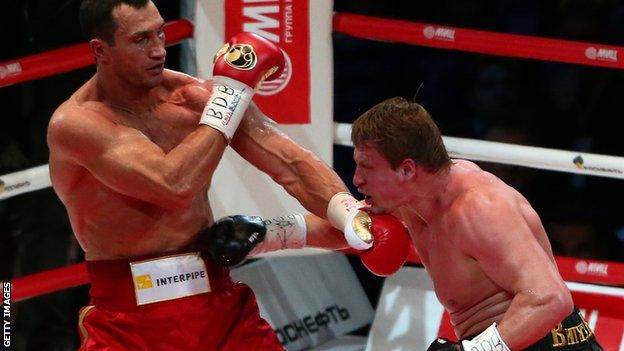Meldonium: Boxer Alexander Povetkin tests positive for banned substance
- Published

Povetkin unsuccessfully challenged Wladimir Klitschko for the WBO, WBA, IBF and IBO heavyweight belts in 2013 - his sole defeat in 31 career bouts to date
Russia's Alexander Povetkin has tested positive for meldonium ahead of his WBC world title fight with Deontay Wilder.
A spokesman for the heavyweight told the Tass news agency, external the 36-year-old returned "low concentrations" of the substance in a blood sample in April.
Povetkin's promoters say the WBC will now decide whether the 21 May fight with Wilder in Moscow can go ahead.
The World Anti-Doping Agency said in September it was adding meldonium to its banned list from 1 January 2016.
Andrei Ryabinsky, the head of Mir Boksa promotions, described the situation as "ambiguous".
"He consumed it in September last year. He has not taken it since 1 January," he added.
"We have been in contact with the World Boxing Council, which is to decide if Povetkin's boxing bout against Deontay Wilder will take place or not."
Povetkin's fight against American Wilder, the reigning WBC heavyweight champion, is due to take place at the Megasport complex in the Russian capital.
Meldonium |
|---|
Thought to improve stamina and endurance |
Designed to treat ischemia and used by diabetes suffers |
Banned by Wada since 1 January 2016 |
Featured on Wada's watch list in 2015 |
Povetkin is the latest among several Russian athletes to fall foul of the new meldonium ban.
Tennis player Maria Sharapova was the first high-profile athlete to test positive for the Latvian-made drug - in a test taken at the end of January - but since then leading Russian athletes from boxing, skating, swimming and winter sports have all failed tests for the substance.
Recent Wada figures showed there had been 172 positive tests for meldonium this year - 27 of those involving Russians.
Wada says it is aware of the possibility of the drug remaining in an athlete's system long after taking it, as is claimed by Povetkin's management.
The organisation admitted last month there was "a lack of clear scientific information on excretion times".
It said that athletes might be able to show that they "could not have known or suspected" meldonium would still be in their systems having taken it before it was banned.